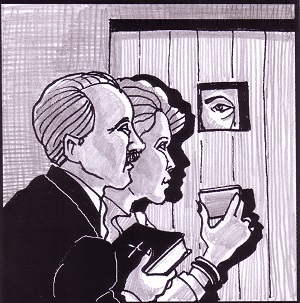

“I do not know where you are from” (Luke 13:25).
Jesus’ announcement that the Kingdom of God was at hand called for a response, so there is an increasing sense of urgency in his preaching as his ministry advances toward Jerusalem. Many of the parables and images Jesus used convey this urgency. Bridesmaids are trimming their lamps as they wait into the night for the arrival of the bridegroom. Invitations to a wedding go out to reluctant guests. A master is returning home and his servants must be alert to his arrival.
Vigilance is required, and disciples must also show a readiness and recognition of what God is looking for in those who are ready to enter the Kingdom. Today’s Gospel returns to the image of a “narrow gate.” It is not enough to have formal credentials or official status as a believer. “I read the catechism and went to Sunday Mass,” some might say, but if they did not do God’s will in action they have never developed personal relationship with God, which is what salvation is all about. “I do not know where you are from,” the doorkeeper will say.
Mutual recognition is the essence of a friendship. We may have many acquaintances, but only personal experiences will create an intimate bond, why real friendships do not happen often. They are the narrow gate that allows only a few to enter. For Jesus, his real friends were those who understood his love for God and for the poor and were willing to find him in their company.
Today’s readings press this essential requirement but also pose a paradox for those who think they have an inside track with God because they are official members of the faith community. Jesus says that the gate is narrow on the one hand but also wide open to anyone who seeks God with love, even if they are an outsider.
One of the great debates at the time of Jesus was about the fate of the nations that were not specially chosen as the People of God. Universal salvation was a controversial topic, but one that Jesus apparently took up in proclaiming God’s mercy for everyone. The criterion that mattered most was love. Anyone who seeks God with all their heart and loves their neighbor as themselves is acceptable to God, and God’s grace is already at work in them, whatever their religious affiliation or ethnicity.
Jesus seems to be directing this as a warning to the self-assured that their path to God would not be served by blocking or excluding others. The lesson may be evident if our worship services this weekend lack diversity and are too homogenous. The real presence we hope to find at church may be measured not by who is there but by who is missing, not only from our faith community but from our family table and circle of social outreach and welcome.
Advertisement








